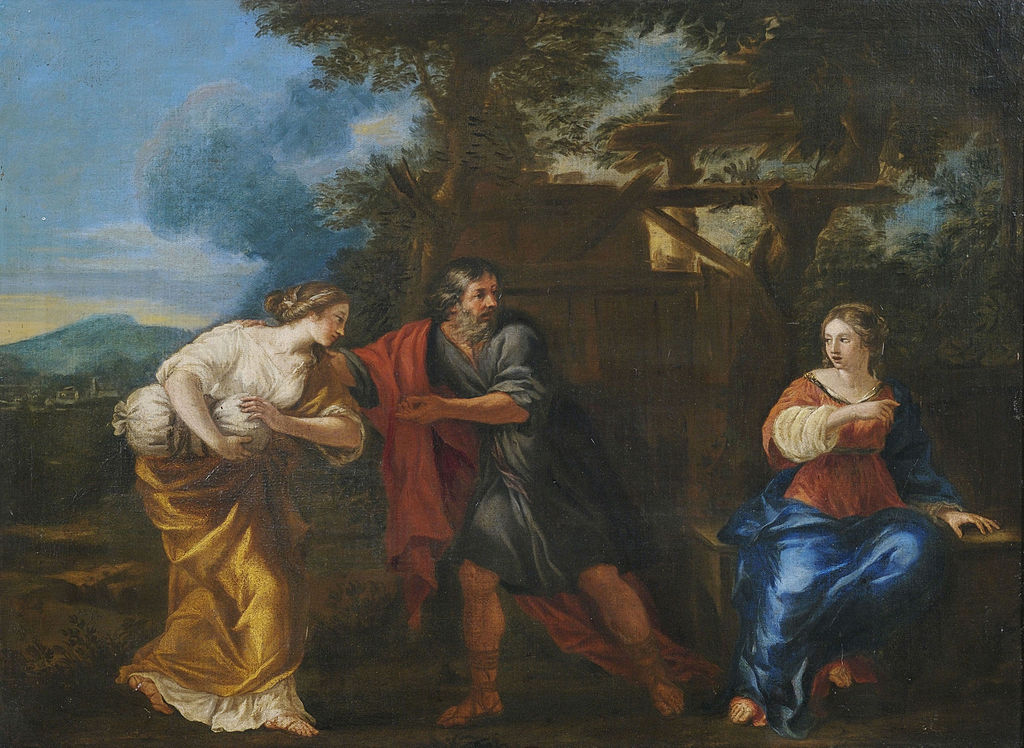[Picture: Sarai is the first example ... Artist: Richard Gunther. Source: Free Bible Images]
[For articles on the “Sabbath of Lech Lecha" in Hebrew, click here]
Updated on November 4, 2022Rabbi Dr. Yossi Feintuch was born in Afula and holds a Ph.D. in American history from Emory University in Atlanta. He taught American history at Ben-Gurion University.
Author of the book US Policy on Jerusalem.
He is the rabbi of Congregation Shalom Bayit in Bend, Oregon.
* * *
Relatively to her husband's, God's reprimand to the Woman ( ‘’Eve’’), following their eating from the Forbidden Fruit, was short and on the whole not harsh at all. Still, God added to the woman's comeuppance a marital detail about Adam, her husband: ''He will rule over you’’, even as Eve's lust will be toward him (Genesis 3:16). What it means says Rashi is that the conjugal initiative will henceforth ensue from the husband, and the woman will be passive and subservient to him (Nachmanides). However, the Torah states elsewhere (Deuteronomy 24:16) that one individual's punishment can’t be imputed to her next generation; vicarious punishment doesn't work in the Hebrew Bible. This aspect of Eve’s divine sentence was hers alone; her daughters (Gen. 5:4) were not to be affected by it. (Birth pangs continue from generation to generation due to both the unique human expended brain that exacerbates pain, and female physiology. By contrast, Adam’s designated pre-dominant role in determining matters of marital intimacy with Eve is a cultural norm; it is not a religious value or for a biological reason.)
.
And indeed, in this week’s portion, Lech Lecha, it is Sarai who acts as though she had not received Eve’s ‘’memorandum’’, even as she commands her husband Abram to consort with her handmaid Hagar to produce a child whom she intended to adopt as her own son. To be sure, this was not Abram’s initiative, but Sarai’s; she alone had determined with whom her husband must have conjugal relations: ‘’go in…unto my handmaid; it may be that I shall be built up through her’’ (Genesis 16:2). This episode presents Sarai as a wife to whom her husband, Abram, is subservient, even as she ruled over what he must do so the two would have a child through a surrogate mother.
Other women who decided independently with whom, when and where they would consort with another man in order to have a child were the two (unnamed) daughters of Lot. The two were perturbed by their realization that the human race would become extinct after Sodom and Gomorrah were wasted by fire and smoke which they themselves survived together with their father. Hence, Lot's two daughters give strong drink to their father, believing that no other man remained alive in the world but him. Consorting with any of his two daughters would have been inconceivable for Lot, which means that he was the one to become subservient, even twice though totally drunk, to his daughters; it was they who determined the logistics of their intimate encounters with their father. The Rabbis only frowned in this unique case on the names that Lot’s daughters gave to their two sons born from their liaison with their father, Lot. On the other hand, the Rabbis have found no reason to condemn them for their pro-active role in what was technically incestuous relations.
[Picture: Lot and his daughters... The image is in the public domain]
In another story Leah trades her aphrodisiac mandrakes (that her son Rueben gave her) with Rachel who concedes in exchange to Leah her ‘’right’’ to consort that night with their husband Jacob. Indeed, if Jacob had other thoughts as to whom he would rather consort with that night, Leah who ‘’hired’’ from Rachel that night was quite blunt with him. Jacob, who had just returned home from the field in the evening had Leah coming out ‘’… to meet him, and saying: ‘You must come in unto me; for I have surely hired you with my son’s mandrakes’. And he lay with her that night.’’ Here again, Eve’s retribution is reversed and it is the wife who makes her husband subservient to her desires.
Tamar is another example of a woman who is determined to consort with Judah, her twice-bereaved father-in-law, seeing him rightly as her only practical recourse to uphold the levirate institution and conceive a child who would carry the name of her first husband, Er, Judah’s eldest son who had died. Tamar, disguised as a pagan temple harlot, used her resourcefulness and wisdom to lure the unsuspecting Judah into contracting her ‘’services’’. Ultimately, Judah would find her action as justified and proper, though she tricked him into this infamous liaison by concealing her identity. Indeed, their child Peretz will become the next link from Judah to David and from David to the Messiah.
[In the photo: Tamar and Yehuda. Rembrandt's work. The image is in the public domain]
Another such link to the Messiah’s line will be Oved, the son of Boaz and Ruth the Moabite. Ruth, like Tamar, is anxious to uphold the levirate institution and conceive a child to carry the name of her deceased husband Machlon. In order to secure her redeemer – a close relative of her husband’s family -- Ruth strategizes her moves with a laser-focus attention to details as she ‘’targets’’ Boaz, who is the 8th link in the Judah to David bloodline, and then to a future descendant, the Messiah. But Ruth needs to capture Boaz’s full attention through a woman’s initiative and innovation. Otherwise, there is no way that the wealthy Boaz, who was much older than Ruth, would initiate any romantic interest in her.
Helping Ruth in devising a plan to do just that is Naomi, her bereaved mother-in-law who must exploit the one-time nightly opportunity when Boaz winnowed barley, even at the threshing floor. Naomi then sends her to ‘’wash and anoint yourself, and put on your best clothes and go down to the threshing floor.’’ Naomi boldly tells Ruth to ‘’uncover his feet and lie down; and he will tell you what to do.’’ And indeed, Ruth ‘’came stealthily and uncovered his feet, and lay down''. When Boaz woke up at midnight he was ‘’startled’’ to see Ruth ‘’lying at his feet’’. Ruth then takes the initiative and asks him to marry her, and become the redeemer to her late husband’s name: ‘’Spread your cloak over your servants, for you are next-of-kin.’’ Boaz then calls Ruth ‘’a woman of valor’’; the only woman to be recognized as such in the Bible. Before long the two would be married and blessed with their son Oved, the grandfather of the future king of Israel, David.
Also the Midrash amplifies the role of Israelite women during the terror regime of Egyptian slavery when their husbands failed their role in procreation. We thus read: "Thanks to the righteous women of that generation, Israel was liberated from bondage in Egypt''; it is they who enticed their husbands, who had practically divorced them because they did not want to beget sons only to see them heaved into the Nile river in compliance with the monstrous fiat of the Pharaoh. Thus it is the Israelite women who initiated intimate relations with their abstaining husbands for the purpose of bringing children into the world.
Eve’s reproach by God that destined her to be ruled over by her husband who would be the only proactive partner in their intimate relationship might have been the case in her post-Eden life as a consequence for her role in the forbidden eating of the proscribed fruit. But the Bible and the Midrash provide us with a good number of examples that attest to the fact that Eve’s comeuppance was not vicarious and was not passed on to other women; indeed, the episodes described above prove that women were not at the ‘’mercy’’ of their husbands when it came to their initiative-taking in the realm of marital intimacy; Sarai (in this weekly Torah portion) being the trailblazer of this reality.
[For articles on the “Sabbath of Lech Lecha" in Hebrew, click here]

![[Picture: Sarai is the first example ... Source: Free Bible Images]](https://www.xn--7dbl2a.com/wp-content/uploads/2021/10/שרה-צוחקת.jpg)







